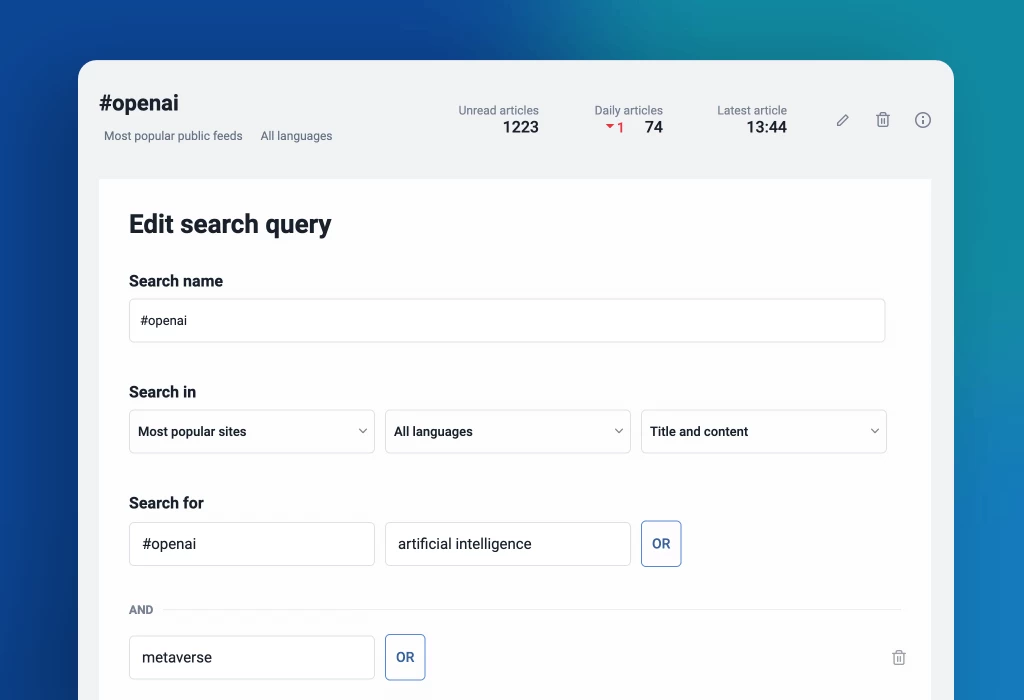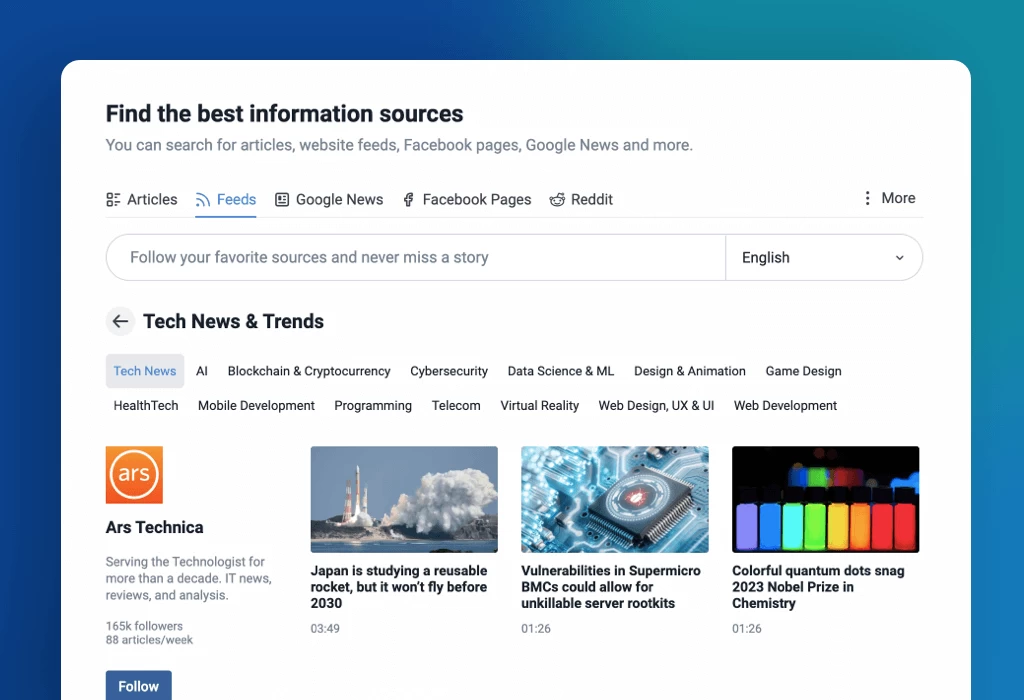Navigating the AI craze

2025 Update
This post from 2023 reflected our broad stance on AI-driven content consumption. Since then, the technology has evolved, the initial excitement around AI has settled, and new use cases have emerged. While we still don’t believe AI is the solution to every problem, we’ve carefully assessed its potential and recognized areas where it can genuinely assist people, rather than replace jobs or disrupt livelihoods.
That’s why, in 2025, we introduced a new suite called Inoreader Intelligence, designed to help people work with their data. We believe article summarization is one such feature, which doesn’t take away from the core Inoreader experience but rather enhances it. It can summarize, structure, and even answer specific questions about an article in seconds – something that might take a person several minutes to find in a lengthy text. For those handling hundreds or thousands of articles daily, these time savings can make a significant difference.
If you’d like to learn more about Inoreader Intelligence, check out the announcement here.
Amidst the Information Age, where social media, algorithmic feeds, politicized content, advertorials, and deepfakes have become an increasing part of our lives, the significance of staying well-informed has never been greater. The digital realm offers a vast sea of knowledge mixed with misinformation and skewed narratives. In this landscape, curating the news you consume can feel daunting, demanding your time and effort. It’s easy to see why the promise of AI-generated newsfeeds designed to simplify our information intake can seem alluring to many.
As we delve into the depths of AI-driven news personalization, we must recognize the issues beneath the surface. While AI has its merits, it also raises serious concerns. In this exploration, we’ll uncover some of these challenges and compare them to the alternative: harnessing the power of RSS technology and platforms like Inoreader to regain control over our information choices and deepen our understanding of the world.
The appeal of personalization
In a rapidly evolving digital landscape where convenience and personalization reign supreme, AI-powered news reading has emerged as an attractive proposition. Yet, while the idea of AI crafting tailored briefs that align with our individual interests and reading habits sounds appealing, there are long-term issues related that deserve our attention.
One of the potential pitfalls of AI-driven news personalization lies in its ability to inadvertently foster information bubbles and echo chambers. Designed to filter out content users have previously disliked or failed to engage with, such algorithmic systems often trap readers in a self-perpetuating news cycle, reinforcing preconceived biases and misconceptions. Without exposure to different perspectives, we are often deprived of the context required to grasp complex events, operating with a limited glimpse of the world.
While offering a sense of instant gratification, AI-driven news personalization threatens to minimize our capacity to engage critically with new ideas and perspectives challenging our own.
The dangers of absolute objectivity
Fed up with deceptive news headlines designed to boost engagement, some readers suggest employing AI to transform sensational titles into more neutral, fact-focused summaries. Others even go as far as suggesting that AI could be used to assess articles’ quality to help readers decide whether consuming them is worth their time.
At first glance, this approach seems promising in its ambition to eliminate bias. However, the pursuit of absolute objectivity could strip journalism and news reporting of their human touch, desensitizing us to the interplay of emotions that go hand-in-hand with public information. In an AI-dominated news landscape, we risk losing our ability to discern the delicate balance between facts, interpretation, and human narratives that enrich our understanding of the world.
The promise of saved time
Many power users see AI as a valuable tool for condensing lengthy articles into brief summaries, offering a way to save precious time in a busy media environment. Although reading a quick overview can be a practical decision when your time is limited, turning this into a regular habit might hide some risks. Quite tempting and convenient, mainly relying on summarized content can condition us to prefer oversimplified narratives over time. The frequent consumption of bite-sized information may create the illusion of knowledge, while in reality, it only scratches the surface, lacking the depth needed for a genuine understanding of the rationale, nuances, and essence of a news story, analysis, or opinion piece.
Is RSS old news?
Not at all, especially if you value control and depth in your news consumption. With the use of RSS technology, you have the power to curate your news experience in a way that AI algorithms can’t replicate. Of course, you can handpick the sources and creators you wish to follow, ensuring you’ll always get content that aligns with your interests and values. But here’s where it gets interesting – you can also expand your horizons by monitoring the broader coverage of trending topics and events, ensuring you get the whole picture.

Unlike AI algorithms that filter your content and choose what you see, RSS presents you with all posts from the feeds you follow the minute they’re published online. This means you’ll never miss out on important updates or be subjected to personalized bubbles that limit your perspective if you pick your sources carefully.

Moreover, RSS readers like Inoreader enable you to build a personal content repository over time. You can apply tags, annotate articles, and save them for later reading or reference, creating a valuable resource that grows with your interests.
Ultimately, the key advantage of RSS lies in the human touch. It puts you in the driver’s seat, allowing you to decide whether you want to explore different opinions or maintain a specific perspective. You have the flexibility to set up your news aggregation systems to suit your preferences and habits. In a world increasingly driven by AI, RSS technology reminds us that human intent remains paramount in shaping our news experiences.
Ready to take control and build your own newsfeed?


